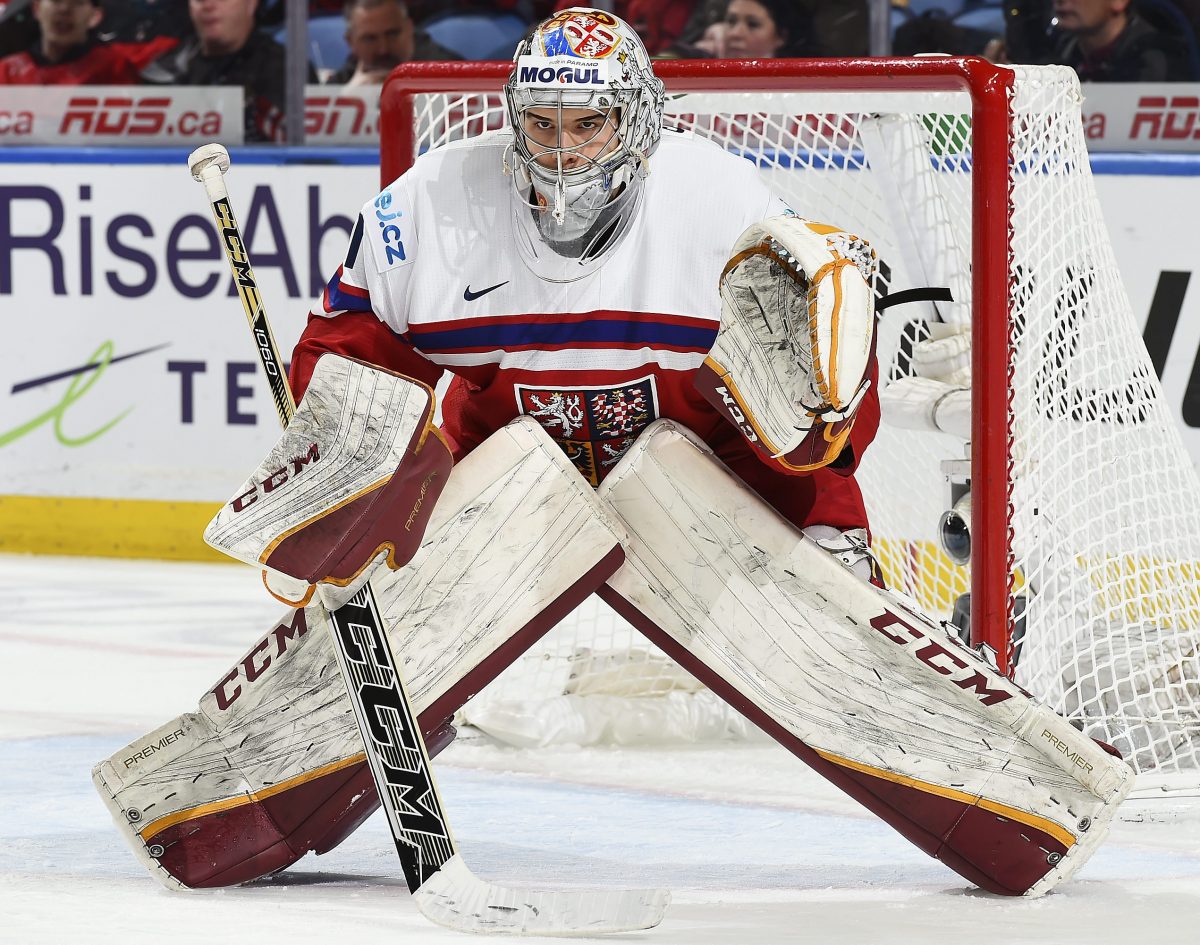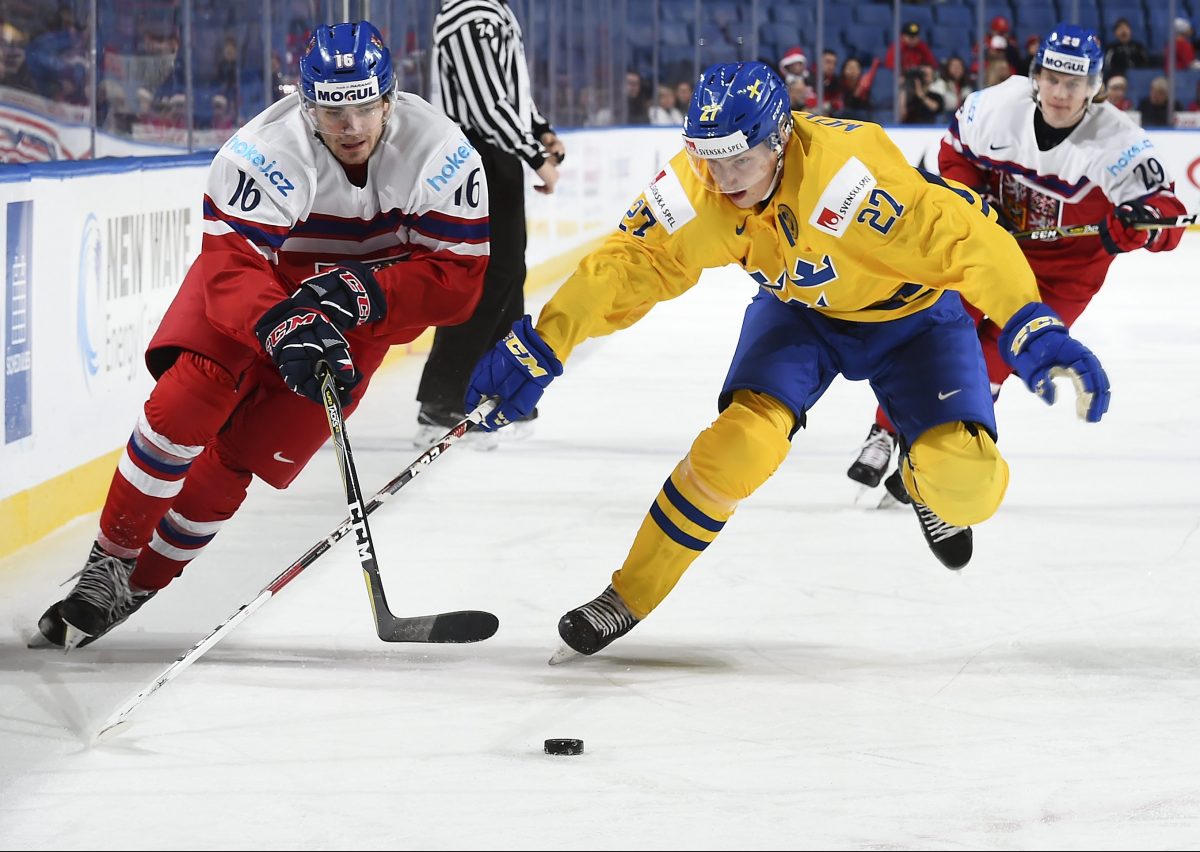It was whispered in some quarters (hint: here ß https://www.mckeenshockey.com/nhl-blog/wjc-2018-team-preview-czech-republic/) that the Czechs might be on the upswing. In hindsight, it should not have been hard to spot. Even though the nation had not been able to escape the quarterfinals of the year-end WU18 tournament since 2013-14 (and all of those players have since aged out of junior level hockey) the nation did medal in four of the past five Ivan Hlinka tourneys, including a 2016 gold.
That gold medal squad was well represented on this iteration of the Czech U20, including stars Martin Necas, Filip Chytil and supporting players Jakub Skarek, Jakub Galvas, Filip Kral, Radim Salda, Martin Kaut, Ostap Safin, and Filip Zadina.
With the more “proven” players listed above being offensively talented forwards, it should have come as no real surprise that the team had a very potent offense. Their 18 goals in the preliminary round was second only to Sweden in Group B, and fourth among all competing nations.
On the other hand, what proved to be their downfall was also relatively easy to spot. They surrendered 15 goals in those same four games, ranking seventh out of ten teams, ahead of only one squad that finished out of the relegation round. Their netminding was so unsteady that head coach Filip Pesan called for his backup in four of their seven overall games.

On the other hand, that type of quick trigger finger may have hurt as much as it helped, with both main goalies, the aforementioned Skarek – perhaps the top netminding prospect for the 2018 NHL draft – and Josef Korenar - signed as an undrafted free agent to an ELC by the San Jose Sharks after a solitary strong season with Lincoln of the USHL – anticipating a spot on the bench every time the opposition gained the zone with numbers. Skarek had moments were he looked like the real deal, especially early in the tournament. He moves around the crease very well, and is able to cover the net from post to post. But he fought the puck all too often. Korenar showed some scramble ability and comfort moving to get to second chances, but traffic was a bugbear and there were simply too many second chances for anyone’s comfort. Skarek will get another chance to redeem himself on the world’s greatest U20 stage next year in Vancouver.
The blueline also did its part in lighting fires. Despite having a broad range of NHL-affiliated young defensemen to play with, they could rarely keep their opponents from threatening the Czech netminder. Even relegated Belarus scored five of their 10 total goals in a thrilling game against the Czech side. Outside of clear number one blueliner Libor Hajek, a Tampa Bay second rounder, each member of their rearguard stumbled more than one. Hajek was awesome. A workhorse, he played a minimum of 20:22 in every game, including a staggering 30:46 in the quarterfinal upset win over Finland. He was a key cog at both ends, using positioning and a good stick to help sweep away danger in the defensive end and swiftly carrying the puck up the ice to help in the quick strike attack that was so effective at times for the Czechs.
Buffalo prospect Vojtech Budik, generally Hajek’s partner on the first pairing, did some nice things when he had the puck, but all too often avoided confrontation when defending, giving his opponent too much room in which to maneuver. Chicago prospect Jakub Galvas was reliable, but prone to own zone giveaways that saw him relegated to third pairing duties more often than not. Dallas prospect Ondrej Vala rarely did enough to escape the third pairing and was more often than not invisible, despite finishing second among Czech blueliners with 10 shots on goal. If there was a second defender after Hajek who escaped the tournament with passing grades it was draft eligible Filip Kral, now in his first North American season playing in the WHL with Spokane. Although he needs to add bulk, he impressed with his positional play and high panic threshold. His decent shot and above average puck moving ability should see him hear his name called on draft day this year.
If I wanted to nitpick the Czech attack, I would point out that I expected more from Rangers first rounder Filip Chytil. He was fine, scoring twice, and every now and then having a dominant shift highlighting his quick feet and hands. He even showed some toughness, playing with a broken nose. But I am selfish and wanted more. So for more I could turn to Martin Necas, who tied for the overall tournament lead in scoring with USA’s Casey Mittlestadt with 11 points, or Filip Zadina, one of the top prospects for the upcoming draft, who consistently demonstrated every type of offensive skill one could want in a forward prospect. His skating, shot, and puck skills all grade out as high end. He could stand to improve on his recognition and decision making in his own zone, but nothing about his game suggests that he is merely a one-way player. Zadina has superstar potential (Necas already is a superstar for this age-level) and is not far from reaching those heights. Among all players in the tournament, only American Kieffer Bellows took more than Zadina’s 37 shots on net.

The next three most effective Czech forwards in the tournament were all as yet undrafted, although one has not yet been eligible for those honors. The youngest of the second trio was Martin Kaut, who will challenge Skarek for the title of highest drafted player in 2018 playing in the Czech Republic. Although lean, he plays a heavy game, making his presence felt in a physical way game in and game out. He plays a strong possession game, and shows solid passing skills. He finished the tournament with seven points in seven games. Radovan Pavlik and Kristian Reichel have both already been passed over in the draft twice each, but their respective performances in Buffalo might push their luck to change in their third go-round. It was the undersized Pavlik’s first appearance in the WJC and he made the wait worth it, with six points in the seven games. He is a nice skater with good edges, has good offensive vision and works hard for rebounds. He will have to improve his Czech league production to maintain his WJC momentum through draft day, but the last few weeks are certainly a mark in his favor. Kristian Reichel, whose father Robert had a long NHL career in the 90s, has been acclimatizing to the NHL game with a poor Red Deer squad and seemed to get better as the WJC progressed. A dogged player, he featured heavily on both Czech special teams’ units. He is an above average skater, which plays up due to his great hustle, can dangle with the puck and can score with both a slap shot and a wrist shot. His frame looks wide enough to carry more weight as he matures. I expect him to be drafted if his WHL play keeps up.
Of the players mentioned above, only Reichel, Pavlik, Hajek, Budik, Vala, and Korenar will have aged out by next year. If at least two of Zadina, Necas, and Chytil are not in the NHL and are thus available to represent their country once more, the Czech squad could be even stronger in 2019. Then again, with as talented as those three are, I would not bet on it. Still, even without them, there was enough production from the 18 year old cohort this year to expect the Czech Republic to show well again next year.































